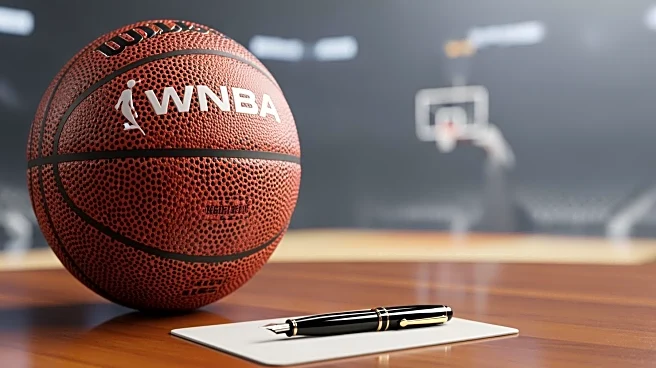What's Happening?
The WNBA's official social media accounts have come under fire for repeatedly misspelling the name of Indiana Fever superstar Caitlin Clark. This issue has persisted throughout Clark's rookie 2024 campaign,
frustrating her large fan base. The mistakes include spelling her name as 'Cailtin Clark' in a social media graphic for the All-WNBA teams and 'Caitlyn Clark' during a broadcast of a Seattle Storm vs. Phoenix Mercury game. Despite efforts to highlight Clark's achievements, such as a poll recognizing her rookie record for assists, the repeated errors have led to criticism from fans who feel the league's social media presence does not adequately reflect Clark's stardom.
Why It's Important?
The repeated misspellings of Caitlin Clark's name by the WNBA's social media accounts highlight broader issues of recognition and representation within women's sports. Clark, a prominent figure in the league, has a significant fan base that expects accurate and respectful acknowledgment of her contributions. These errors can undermine the league's efforts to promote its players and engage with fans effectively. The situation underscores the importance of attention to detail in digital communications, especially when dealing with high-profile athletes, and reflects on the league's commitment to its players and audience.
What's Next?
The WNBA may need to address these social media errors to prevent further frustration among fans and ensure accurate representation of its players. This could involve reviewing and improving its content creation processes or providing additional training for staff responsible for digital communications. As Caitlin Clark continues to make her mark in the league, the WNBA's ability to accurately and consistently highlight her achievements will be crucial in maintaining fan engagement and promoting women's basketball.
Beyond the Headlines
The recurring misspellings of Caitlin Clark's name may also reflect broader challenges in women's sports regarding visibility and recognition. Ensuring accurate representation of athletes is essential for promoting gender equality in sports and fostering a supportive environment for female athletes. This incident could prompt discussions about the role of media in shaping public perceptions of women's sports and the importance of equitable treatment in all aspects of sports promotion.











